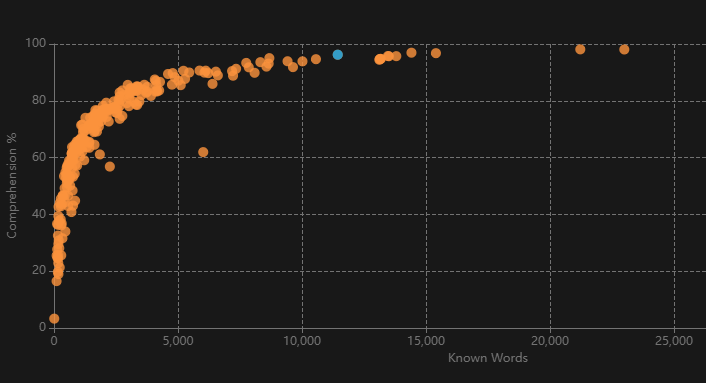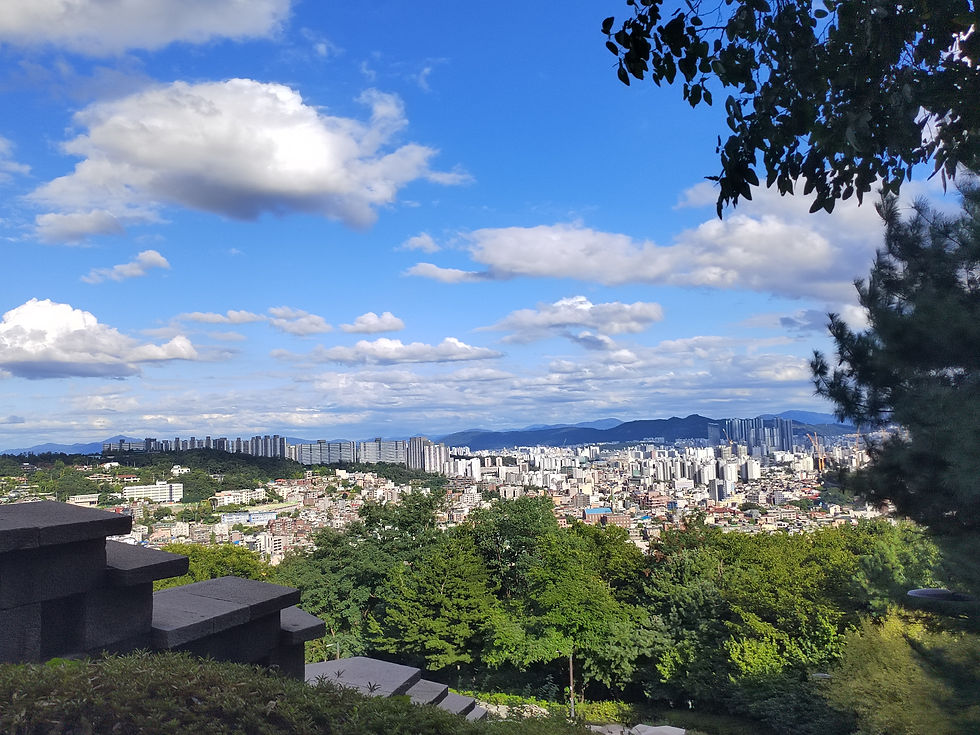- Oct 11
- 8 min read
Some milestones to start us off with:
(4) Years
(3000) Immersion hours
(11400) Known words
(71) Books read
(125) Class hours….
And after all that I don't feel anywhere close to ‘fluency’.
I can follow a true crime podcast but I miss bits. Dates and places said quickly at the start of an ep go right over my head and it takes me to the middle of the next sentence to work them out. Listening to two or more natives chatter without perfect sound is pretty hard to follow. I still have to look up 4-5 words on most pages of a book. I can’t always speak easily in class because it's hard to activate words and I get tongue tied. I can write and have it mostly make sense but I still make silly grammar/typing mistakes and most of the time although what I write is understandable, I can’t always say what I want in a natural way.
So where does 2 hours a day for 4 years get you?
At this point in the journey a lot of the past months and years have blended together for me, so I really have to look at past blog posts to remember where I was a year ago. Compared to last year…
🍵📖 Reading is so much easier my lord. I’m at 71 books read (a mix of native YA and adult) and finally I feel like I can read quite smoothly. My reading speed is still something like 2 mins per page, it hasn’t sped up at all but reading is a whole lot less tiring and everything just flows now. I will say... 71 books (which took me two and a half years) is longer than I expected it to take to reach this point.




These are some comprehension graphs of some random native books for adults that I haven’t read before. (I’m the blue dot, the yellow dots are other users of the app) You can see in the first two (murder mystery novels) compared to the scifi book that my domain specific love of crime has paid off vocab wise.
I don’t know if people might find my word-count low for how reading-heavy I am….but I don’t do SRS and in general am slow to move things from seen to known which maybe accounts for it. Also I love me the ‘ignore’ status on proper nouns.
While murder mysteries are a smooth ride now with very manageable lookups, things like sci fi and literary fiction like Han Kang novels are still out of my reach. (The comp difference between 91% and 96% in a cat 4 lang is absolutely wild. I don’t generally read anything below 95%)
(﹙˓ 🎧 ˒﹚) Audiobooks of things I haven’t already previously read are….still not super comfy. This is due to unknown vocab in part but also words I could recognise in writing but don’t have a saved mental audio file for yet.
I listen to podcasts while I get ready each morning. 12 months ago these were mostly the harder learner podcasts with the rare native show mixed in. Now I overwhelmingly listen to native podcasts about either true crime or general lifestyle/queer chitchat. I can follow them comfortably as long as they don’t refer to too many people/places/events that I am not already familiar with. I still miss some details but there is a lot less fuzz than there was last year.
There are still learner podcasts I can’t follow 100%, esp about history or politics. Listening to groups of natives chat on livestream without perfect sound is still hard. We don’t talk about the news.
Something I’ve noticed a lot about my vocab - most of my listening is idol lives or true crime podcasts, and most of my reading so far has been YA and detective novels. Amusingly there are basic words like 정부 (government) that aren’t particularly acquired for me. I know them in context, but they are very shallowly acquired. Whereas things like 과도 (fruit knife) or 촬영 (filming) feel like much more common words to me.
📚🎒Comparison to uni
I did a 4 year undergrad degree in Japanese 15 years ago. It was taught using very traditional methods of memorization and grammar drills.

The scheduled hours for my degree were 200 hours of language study per year, which included independant learning hours. I checked the same course details for 2025 and only about 60 of those are pure teaching hours which is crazy to think about. Despite completing my degree including a year abroad in japan where I had a part time job babysitting local kids after school and then going on after graduating to work in a job that required me to speak Japanese daily to both customers and one of my colleagues, I never felt comfortable in Japanese.
Kanji was always a nightmare for me and I was always frustrated at myself for not being able to ‘memorize kanji properly’. Why didn’t the 50+ characters I tried to memorize each week stick in my head? Why did I forget readings all the time? Why couldn't I remember how to write them by hand months after rote memorizing them and being someone who never had to write in daily life? Hmm a mystery.
I was able to communicate fine at work, but I didn’t enjoy using Japanese. I was far too aware that although the other person could understand me, I often wasn’t speaking naturally and saying things the way a native normally would. I very often had to simplify what I wanted to say because I didn’t have a command over the nuances of the language.
I never got into reading books or even engaging with much media in jp. During uni i was busy memorizing characters and doing grammar homework. Content for natives was always for later, for when I had learned the language. It also made me feel awful when I tried because my comprehension was garbage. Despite working so hard and putting so much effort into this thing, I was clearly just very bad at it.
Learning Korean via immersion has been very healing in terms of looking back on the experience I had with jp, understand why it played out how it did and letting go of all of the shame I had about it. I understand korean on a much deeper level than I ever managed to achieve with jp using the traditional study I was taught in uni. The idea of reading native books and listening to native podcasts would have filled university-student me with absolute dread, but in Korean it’s such a regular part of my day I barely think about the fact it’s in Korean. Learning jp was full of stress and anxiety, I have so much fun with Korean. I get to stay up past my bedtime reading page-turners or pause mid-chore to laugh out loud at an audiobook. If I am generous I'd say I probably spent 2000 hrs learning jp at uni, almost completely via textbooks and rote memorization. In the same period of time and 1.5x the hours, it wild to see how different my experience of Korean has been.
🗺️⁀જ✈︎ 2025 Trip
Speaking of fun, I managed to visit kr this year!
I went with my friend to Seoul for 9 days. My friend doesn’t speak any korean so I took on the task of planning our itinerary and speaking when need be. We had an amazing time, and I’m glad I waited until this point in my learning to go. Navigating around was very easy and using services in kr wasn’t a bother. It was a little strange how …normal… everything felt to me. I see and hear kr every day at home so ofc it’s a very regular part of life to me, so even though it was my first time, actually being in the place that I guess I am mentally for a few hours a day made everything feel familiar. Like I was coming back to visit a place I used to live. I don’t know how else to describe it, it was a very strange experience to have in a new place.

There were definitely some awkward interactions. We weren’t sticking to only super touristy activities and in some places it was clear maybe the staff didn’t speak english and were anxious at the thought of having to awkwardly interact when they seen us. Most of the time when I opened my mouth and started speaking they relaxed and were totally fine but once or twice it seemed like I was too foreign and they couldn’t switch back into kr mode. I had long interactions with some shop staff when debating buying over a few things like jewellery and camera equipment and I was able to do those fine so I know my kr was ultimately intelligible. I definitely felt a kind of immediate review loop happening in my brain when I was interacting with people. I’d say something and then after the interaction my brain would repeat the conversation and I’d think “oh this would have been the natural way to phrase that!” or someone would repeat back a word and I’d immediately hear where I wasn’t pronouncing it right and I’d feel it overwrite my mental sound file.
On the way home I took a Korean Airways flight and the cabin crew were speaking kr to everyone else and then switched to english with me and I was jolted back into reality. For a minute I was baffled at why they weren’t just speaking like normal 😂 I guess I wasn’t ready for the trip to end.

🎯Path/vision goals from here
It’s time to read some paperbacks to prove to myself I’m not faking this reading in kr thing. I’ve already started with 네버 라이 for the natively book club and it’s going surprisingly okay.
hit 100 books read (I’m at 71 right now so I’ll hit this by the end of 2026)
take a freetalking class (I hate awkward conversation so hopefully i can find a tutor who can help me keep a convo going)
I’d like to get to a point where I can have a long conversation with someone without much stumbling or fumbling for words so a lot of vocab activation is going to be needed.

📝👀TOPIK
Will I sit it? Will I? Idk
In my weekly class we are doing 1.5 hour regular grammar study and then 30 mins TOPIK II test prep with 1hr of test prep homework (like long practice listening sections). The stuff we’ve covered so far (level 3 as we’re starting at the beginning of the paper) has been really easy and honestly doing it at the end of the lesson feels like a nice little cool-down from the rest of the class. I’ve no idea if it’ll ever sit the test, I mean it’s no use to me other than a shiny certificate I guess, but we’ll see.
Anyways, until next update...





